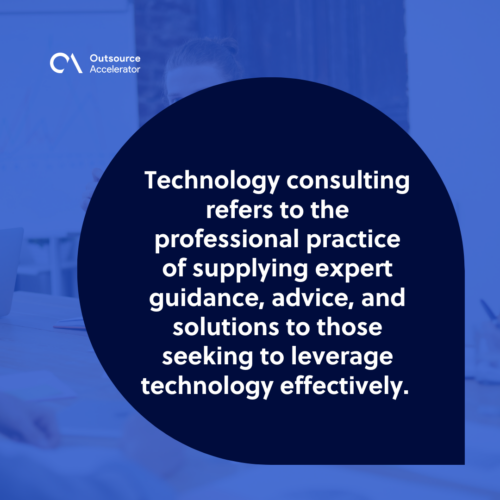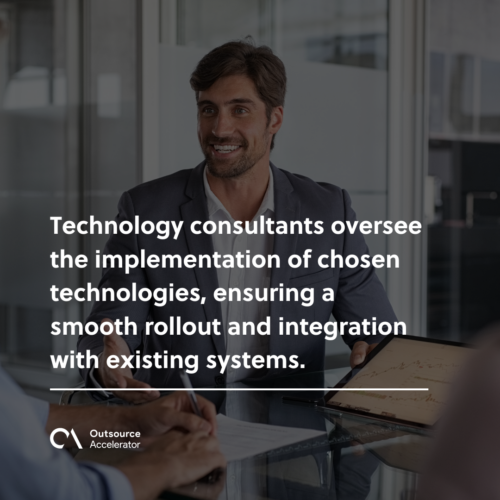Thriving in the digital age with technology consulting

Businesses of all sizes need to keep up with the latest trends and innovations. But with an endless array of options and solutions, navigating the complex world of technology can be overwhelming.
That’s where technology consulting comes in.
Technology consulting experts provide guidance and support to help businesses evaluate, implement, and optimize a wide range of solutions.
Technology consulting can unlock powerful opportunities and help companies stay ahead of the curve, from digital transformation and cybersecurity to cloud computing and artificial intelligence.
What is technology consulting?
Technology consulting refers to the professional practice of supplying expert guidance, advice, and solutions to those seeking to leverage technology effectively.
The primary goal of technology consulting is to bridge the gap between technical knowledge and business needs. This solution enables clients to make informed decisions about technology investments and initiatives.
Clients should aim to harness their technology’s capabilities effectively, enhance operational efficiency, drive innovation, and achieve sustainable growth.

Role of a technology consultant
Technology consultants possess deep expertise in various technological domains, industry trends, and best practices. This allows them to serve in an advisory role as businesses navigate the technological landscape.
Here are the major responsibilities of a technology consultant:
- Technology implementation – It involves overseeing the implementation, configuration, updating, and maintenance of IT systems and components.
- Analysis and consultation – Technology consultants perform analyses on hardware, software, and network capabilities. They also consult with management and other departments to identify opportunities for improvement.
- System efficiency improvement – This requires consulting with end-users to understand their needs and provide solutions.
- Infrastructure analysis – It involves analyzing a company’s IT system and infrastructure, diagnosing problems and weaknesses.
- Project planning and management – Technology consultants plan project timelines and coordinate the execution of technology initiatives.
- Solutions development – This involves understanding client business needs and implementing solutions to meet them.
- Security analysis – Technology consulting includes analyzing and determining security threats, as well as implementing measures to protect systems and data.
- Training and support – Technology consultants provide training and support to end-users on hardware functionality, software programs, and new technologies.
Technology consulting process
The technology consulting process is a structured approach to provide comprehensive and effective guidance to businesses. It involves several stages to ensure technology solutions align with the client’s goals and objectives.
Here’s an overview of the typical technology consulting process:
Initial assessment
Technology consulting begins with engaging the client to gain a thorough understanding of their business goals, challenges, and current technology landscape.
Consultants identify pain points, inefficiencies, and areas for improvement.
Strategy development
Technology consultants collaborate with key stakeholders to define clear and specific technology objectives that align with the client’s overall business strategy.
They develop a detailed technology roadmap. This outlines the steps and milestones required to achieve the identified objectives.
Technology solution selection
Consultants assess various technology options, considering factors such as functionality, scalability, compatibility, and cost.
These technology solutions are tailored to meet the client’s unique requirements. This ensures a precise fit for their business needs.
Implementation and integration
This step of technology consulting has consultants create a detailed project plan. The plan includes timelines, resources, and responsibilities.
Technology consultants oversee the implementation of chosen technologies, ensuring a smooth rollout and integration with existing systems.

Change management
To ensure a smooth transition after technology consulting, consultants provide training and education to end-users to ensure they are proficient in using the new technologies.
Any changes are communicated to employees to help them understand the benefits and address any concerns.
Monitoring and optimization
Consultants continuously monitor the performance of implemented solutions, collecting data and feedback. They analyze the collected data to identify areas for optimization and make necessary adjustments to enhance system performance.
Cybersecurity and compliance
Technology consultants conduct a thorough assessment of cybersecurity risks and vulnerabilities. Part of their role is to recommend strategies to mitigate potential threats.
They also ensure that the implemented technologies comply with industry regulations and data protection standards.
Continuous improvement
Technology consulting requires staying informed about emerging technologies and trends. It’s essential to provide clients with insights on how to remain competitive.
Consultants maintain an ongoing relationship with the client, gathering feedback and making iterative improvements to the technology solutions.
Documentation and reporting
Finally, comprehensive documentation of the technology implementation is provided. This report includes configurations, processes, and best practices.
All regular progress reports and performance metrics are shared with the client to track the success of the technology initiatives.
Why do businesses need technology consulting?
Businesses need technology consulting for a multitude of compelling reasons:
Strategic alignment
Technology consulting tailors solutions to align technology initiatives with a company’s overall business strategy. This ensures that implemented technologies address unique needs and achieve objectives.
Expertise and knowledge
Technology consultants bring specialized expertise and up-to-date knowledge of the latest industry trends, best practices, and emerging technologies. This knowledge empowers businesses to make well-informed decisions and avoid costly mistakes.
Efficiency and productivity
Technology consulting enables organizations to streamline operations, reduce manual tasks, and enhance overall productivity. These innovative solutions grant a competitive edge that differentiates them in the market.
Cost-effectiveness
Consultants assess technology investments, helping businesses optimize their budgets. Part of their responsibilities are to identify cost-effective solutions and avoid unnecessary expenditures.
Risk mitigation
Technology consultants assess and address potential cybersecurity risks and vulnerabilities. This proactive approach helps businesses safeguard sensitive data, maintain compliance, and prevent security breaches.
Scalability and flexibility
Technology consulting produces strategies that let businesses scale and adapt to changing market conditions. Flexibility ensures that technology solutions grow with the company’s evolving needs and set it up for the future.
External perspective
Consultants provide an unbiased external perspective on the business’s technology needs. A fresh viewpoint can uncover opportunities and solutions that internal teams may overlook.
In a rapidly changing technological landscape, businesses that engage in technology consulting services position themselves to adapt, innovate, and thrive.
Leveraging the expertise of technology consultants allows businesses to make strategic technology investments that positively impact their bottom line and overall success.







 Independent
Independent




